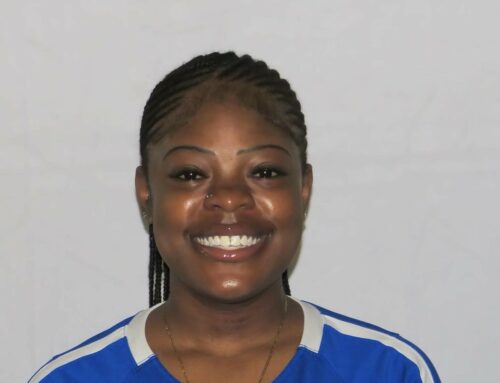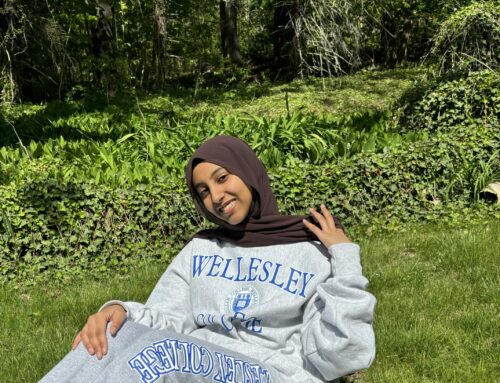by Jenna M. Lavin
Taking a look at a potential school is a crucial step for any student applying to college. This second blog post about my experience as a Site Director will bring to light some important information essential for having a successful college trip. Last week, Let’s Get Ready took over 200 of our students on trips to college fairs at Columbia University and NYU. Every student enrolled in one of our programs has the opportunity to visit at least one or two colleges. These trips are important for prospective college students to gain insight about the kinds of schools they do – or do not – want to attend.
Visiting a school requires more than just showing up to the admissions office and asking for a look around. As a Let’s Get Ready Site Director, I’ve planned and participated in a number of college tours with my students and I know from experience that anyone taking a student on a college tour could make use of some essential information. Here are some valuable tips that I’ve learned so that any college visit can be successful.
1. Make sure the trip is planned in advance. Many schools need you to register for a tour at a specific date and time. You can find information on how to do this on the school’s website or by calling the school’s admissions office. Ask about parking, local accommodations, and food. Usually you have to make special arrangements for larger groups. Often the school will provide light refreshments or possibly even a complimentary meal. Touring schools is hard work and can leave you really hungry!
2. Research essential information and be prepared with good questions. Before the student even arrives at the school, they should have already done research on what majors and programs the school offers. Be prepared! Don’t ask for general information that could be easily found on the school’s website. You should know the average GPA and SAT scores of an admitted student and a profile on the school’s most recent freshman class.
3. Let the student bring friends! College tours can be much more interesting when the student is accompanied by a peer. A peer can offer a different perspective of how they view the school. Remember that a college visit isn’t a social event; make careful observations during the tour. A tour can have a huge potential impact on where a student chooses to apply.
4. Ensure that the student signs in upon arrival. Many schools make a record of the students who visit their campus. Visiting a school demonstrates interest, a factor that the admissions committee considers when going over the applications. School visitations can be a deciding factor if the committee is debating whether to admit a student or not.
5. Pay close attention to the tour guide. Usually, the tour guide is a current student at the school. They can give a unique insight of what student life is really like, and they can usually give genuine answers to questions. Feel free to ask for their contact information in case more questions come up after the tour. The guides are usually happy to help (unless it’s finals week).
6. Ask about financial aid. Usually the admissions office will have a financial aid administrator available the day of the tour. If the student is interested in applying for financial aid, there are extremely important questions that they need to ask. Does the school guarantee to meet 100% of demonstrated financial need? Are there special scholarships available for the student to apply for? Does the school award loans as part of a student’s financial aid package? College is a huge investment. Don’t be afraid to talk money!
7. Get to know the area around campus. Whether you’re visiting a city or a rural school, it’s a good idea to get a feel of the area around the campus. Some schools are in areas where a car is necessary to get around. Other schools have easy access to public transportation.
8. If the student is looking to play varsity sports in college, they should get in touch with the coach before they visit. Get to know the school’s recruitment process and what scholarships are available for student-athletes. The student should get an idea of what time commitment they have to make to the team and consider how they can balance academics and sports.
9. Take a look at schools in the surrounding area. If you are travelling a lengthy distance or paying for lodging, you want to make the most of your time. Even if you’re primarily interested in one school in the area, checking out neighboring schools could present additional opportunities and add to your knowledge base.
10. Don’t be discouraged! It’s important to keep in mind that the majority of schools have a holistic admissions process, meaning that they look at a wide variety of criteria when considering a student for admission. Sometimes students can feel out of place because they have lower grades and SAT scores than the average admitted student. A student is worth more than just a number.
11. It’s okay not to like a school. Visits don’t need to lead to an application. Sometimes college visits can give a student an idea of the kinds of schools they don’t want to go to. College tours are never a waste of time; they will always play a part in helping a student figure out what school is right for them.
12. Say thank you! Students and school administrators put a lot of time and effort into planning quality tours for prospective students. Remember to thank them for their services. Any kind words leave a good impression.
It doesn’t matter if you are a mom or dad, grandmother or grandfather, aunt or uncle, guardian, counselor, or a friend just helping out, being prepared is crucial. The road to college is a bumpy one no matter who you are, so it’s always a wise idea to be a step ahead.
Jenna M. Lavin, current site director at Macaulay Honors College in New York, NY. Jenna is from Brooklyn, NY and is a third-year undergraduate at Boston University studying Economics and Political Science. Jenna is doing a series of blogs for Let’s Get Ready during Summer and Fall 2014.



